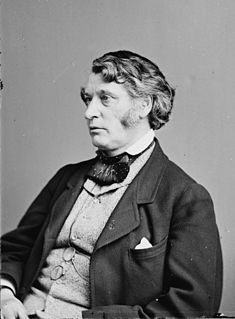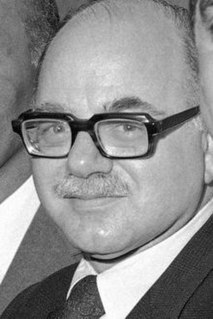A Quote by George Washington Carver
A life that stood out as a gospel of self-forgetting service. He could have added fortune to fame but caring for neither he found happiness and honor in being helpful to the world. The centre of his world was the south where he was born in slavery some 79 years ago and where he did his work as a creative scientist.
Related Quotes
It is obvious that Paul did not regard prayer as supplemental, but as fundamental-not something to be added to his work but the very matrix out of which his work was born. He was a man of action because he was a man of prayer. It was probably his prayer even more than his preaching that produced the kind of leaders we meet in his letters.
I didn't get a chance to meet Glen [Beck] for this movie. I did meet him a few years ago, coincidentally, before any of this happened. But I've been familiar with his work, so I felt I wanted to get it right. I wanted to honor him. I respect him and I think the way he does his job is admirable. Yeah, there was an added incentive. I wouldn't call it pressure, but incentive perhaps.
I don't think that either self-deprecation or self-aggrandizement is among the defining qualities of an artist... Beethoven could have been forgiven if his symphonies had gone to his head. Gretchaninoff could also be forgiven if his Dobrinya Nikititch went to his head. But neither one could be forgiven for writing a piece that was amoral, servile, the work of a flunky.
There are three ways in which a man becomes a slave. He may be born into slavery, or forced into it, or he can deliberately accept his servitude. All three forms flourish in the modern world. Men are born and forced into slavery in Russia and her satellites states. Men in the free world invite slavery when they ask the government to provide complete security, when they surrender their freedom to the "Welfare State."
If you saw Atlas, the giant who holds the world on his shoulders, if you saw that he stood, blood running down his chest, his knees buckling, his arms trembling but still trying to hold the world aloft with the last of his strength, and the greater his effort the heavier the world bore down upon his shoulders - What would you tell him?" I…don't know. What…could he do? What would you tell him?" To shrug.
The Senator from South Carolina has read many books of chivalry, and believes himself a chivalrous knight, with sentiments of honor and courage. Of course he has chosen a mistress to whom he has made his vows, and who, though ugly to others, is always lovely to him; though polluted in the sight of the world, is chaste in his sight I mean the harlot, Slavery. For her, his tongue is always profuse in words.
What importance can we attach to the things of this world? Friendship? It disappears when the one who is liked comes to grief, or the one who likes becomes powerful. Love? it is deceived, fleeting, or guilty. Fame? You share it with mediocrity or crime. Fortune? Could that frivolity be counted a blessing? All that remains are those so-called happy days that flow past unnoticed in the obscurity of domestic cares, leaving man with the desire neither to lose his life nor to begin it over.
The books of the great scientists are gathering dust on the shelves of learned libraries. And rightly so. The scientist addresses an infinitesimal audience of fellow composers. His message is not devoid of universality but its universality is disembodied and anonymous. While the artist's communication is linked forever with its original form, that of the scientist is modified, amplified, fused with the ideas and results of others and melts into the stream of knowledge and ideas which forms our culture. The scientist has in common with the artist only this: that he can find no better retreat from the world than his work and also no stronger link with the world than his work.
No man is born into the world whose work is not born with him. There is always work, and tools to work with, for those who will, and blessed are the horny hands of toil. The busy world shoves angrily aside the man who stands with arms akimbo until occasion tells him what to do; and he who waits to have his task marked out shall die and leave his errand unfulfilled.




































